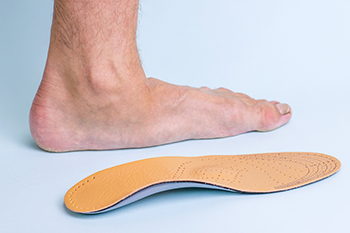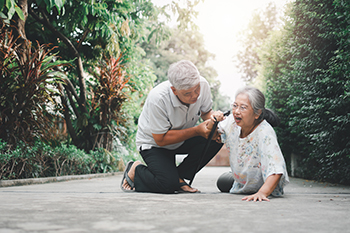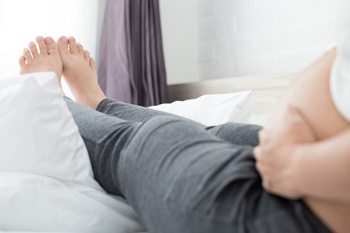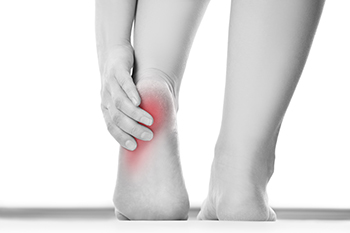Items filtered by date: November 2022
Is Having Flat Feet a Problem?

Having flat feet is when one stands on a flat surface and their entire foot is in contact with that surface, with no visible arch. This condition used to be considered a problem and even used to bar one from military service. While flat feet can be an indicator of poor biomechanics or walking style, they do not always cause problems. Babies are born with flat feet and do not have a foot arch until it is filled with fat as they develop. If the arch drops later in life, it is known as acquired flat foot. This is sometimes associated with problems, like excessive pronation or the foot rolling inward and lowering the arch closer to the ground. Problems with the feet can lead to problems elsewhere in the body, such as knees, hips, and the back. If you have flat feet and they cause you pain, see a podiatrist for an examination and guidance.
Flatfoot is a condition many people suffer from. If you have flat feet, contact one our our podiatrists from Newtown Comprehensive Foot Care. Our doctors will treat your foot and ankle needs.
What Are Flat Feet?
Flatfoot is a condition in which the arch of the foot is depressed and the sole of the foot is almost completely in contact with the ground. About 20-30% of the population generally has flat feet because their arches never formed during growth.
Conditions & Problems:
Having flat feet makes it difficult to run or walk because of the stress placed on the ankles.
Alignment – The general alignment of your legs can be disrupted, because the ankles move inward which can cause major discomfort.
Knees – If you have complications with your knees, flat feet can be a contributor to arthritis in that area.
Symptoms
- Pain around the heel or arch area
- Trouble standing on the tip toe
- Swelling around the inside of the ankle
- Flat look to one or both feet
- Having your shoes feel uneven when worn
Treatment
If you are experiencing pain and stress on the foot you may weaken the posterior tibial tendon, which runs around the inside of the ankle.
If you have any questions please feel free to contact our office located in Newtown, CT . We offer the newest diagnostic and treatment technologies for all your foot and ankle needs.
Gout Pain Can Be Managed
Risks of Falling Among Seniors

As one ages, the repercussions of falling increase. Studies show that people over 65 years old fall at least once a year. Further, one out of five falls results in serious injury. It is commonly held that safety proofing in the home is essential in preventing falls. Other experts agree that keeping a positive attitude and not being afraid of falling is just as important. One of the main recommendations is to have a plan in place in case you do fall. Some people use medical alert devices or carry a phone with them at all times. Practice getting up from the floor in order to be more prepared if you should take a tumble. Changing the way you handle problems is another way to prevent falls. For instance, ask for help rather than get on a ladder to reach a top shelf. Removing hazards, such as loose wiring and scatter rugs from your home is also recommended. Have walking aids available for times when you feel less sure on your feet. Balance and strength exercises are a good way to keep your legs and feet under you. See a podiatrist for more information on ways to prevent falling.
Preventing falls among the elderly is very important. If you are older and have fallen or fear that you are prone to falling, consult with one our our podiatrists from Newtown Comprehensive Foot Care. Our doctors will assess your condition and provide you with quality advice and care.
Every 11 seconds, an elderly American is being treated in an emergency room for a fall related injury. Falls are the leading cause of head and hip injuries for those 65 and older. Due to decreases in strength, balance, senses, and lack of awareness, elderly persons are very susceptible to falling. Thankfully, there are a number of things older persons can do to prevent falls.
How to Prevent Falls
Some effective methods that older persons can do to prevent falls include:
- Enrolling in strength and balance exercise program to increase balance and strength
- Periodically having your sight and hearing checked
- Discuss any medications you have with a doctor to see if it increases the risk of falling
- Clearing the house of falling hazards and installing devices like grab bars and railings
- Utilizing a walker or cane
- Wearing shoes that provide good support and cushioning
- Talking to family members about falling and increasing awareness
Falling can be a traumatic and embarrassing experience for elderly persons; this can make them less willing to leave the house, and less willing to talk to someone about their fears of falling. Doing such things, however, will increase the likelihood of tripping or losing one’s balance. Knowing the causes of falling and how to prevent them is the best way to mitigate the risk of serious injury.
If you have any questions, please feel free to contact our office located in Newtown, CT . We offer the newest diagnostic and treatment technologies for all your foot care needs.
Pregnancy and Fluid Retention

When a woman carries a baby to term during pregnancy, her body undergoes a variety of different physical changes. Many of these changes concern the feet. If you are expecting, you might consider being especially mindful of the extent to which the pregnancy might be affecting fluid retention in the feet and lower legs. For example, during pregnancy, blood circulation to the feet may be diminished, which can cause excess fluid retention. Certain factors may increase one’s susceptibility to this condition. Namely, consuming food that is high in salt and exercising may increase a pregnant woman’s fluid retention and result in swollen feet. Please contact a podiatrist if you are concerned about fluid retention in the feet during pregnancy.
Pregnant women with swollen feet can be treated with a variety of different methods that are readily available. For more information about other cures for swollen feet during pregnancy, consult with one our our podiatrists from Newtown Comprehensive Foot Care. Our doctors will attend to all of your foot and ankle needs.
What Foot Problems Can Arise During Pregnancy?
One problem that can occur is overpronation, which occurs when the arch of the foot flattens and tends to roll inward. This can cause pain and discomfort in your heels while you’re walking or even just standing up, trying to support your baby.
Another problem is edema, or swelling in the extremities. This often affects the feet during pregnancy but tends to occur in the later stages.
How Can I Keep My Feet Healthy During Pregnancy?
- Wearing orthotics can provide extra support for the feet and help distribute weight evenly
- Minimize the amount of time spent walking barefoot
- Wear shoes with good arch support
- Wear shoes that allow for good circulation to the feet
- Elevate feet if you experience swelling
- Massage your feet
- Get regular, light exercise, such as walking, to promote blood circulation to the feet
If you have any questions please feel free to contact our office located in Newtown, CT . We offer the newest diagnostic and treatment technologies for all your foot and ankle needs.
Common Causes of Heel Pain

Heel pain takes many forms, but its main cause is overuse from repetitive activity. The most common forms of heel pain are plantar fasciitis, Achilles tendonitis, and arthritis. If you experience sudden or severe heel pain from an accident or injury, it is recommended to see a podiatrist immediately. Other causes of heel pain include blisters, corns, bursitis, and stress fractures. One way to prevent heel pain is by reducing the stress on the feet when exercising. It is a good idea to stretch and do warm-up exercises before engaging in vigorous activities that can put stress on the heel. Ignoring heel pain is not a good idea, because it can lead to overcompensation and changes of gait. This may then begin to affect other body parts and lead to even more serious problems. If you are experiencing heel pain on a regular basis, or for longer periods of time, please visit a podiatrist for a thorough examination.
Many people suffer from bouts of heel pain. For more information, contact one our our podiatrists of Newtown Comprehensive Foot Care. Our doctors can provide the care you need to keep you pain-free and on your feet.
Causes of Heel Pain
Heel pain is often associated with plantar fasciitis. The plantar fascia is a band of tissues that extends along the bottom of the foot. A rip or tear in this ligament can cause inflammation of the tissue.
Achilles tendonitis is another cause of heel pain. Inflammation of the Achilles tendon will cause pain from fractures and muscle tearing. Lack of flexibility is also another symptom.
Heel spurs are another cause of pain. When the tissues of the plantar fascia undergo a great deal of stress, it can lead to ligament separation from the heel bone, causing heel spurs.
Why Might Heel Pain Occur?
- Wearing ill-fitting shoes
- Wearing non-supportive shoes
- Weight change
- Excessive running
Treatments
Heel pain should be treated as soon as possible for immediate results. Keeping your feet in a stress-free environment will help. If you suffer from Achilles tendonitis or plantar fasciitis, applying ice will reduce the swelling. Stretching before an exercise like running will help the muscles. Using all these tips will help make heel pain a condition of the past.
If you have any questions please contact our office located in Newtown, CT . We offer the newest diagnostic and treatment technologies for all your foot and ankle needs.
Treating Achilles Tendon Injuries

The Achilles tendon is a band of tissue that connects muscles in the lower leg to the heel bone. This is a critical body part that can be associated with a variety of injuries. If one has developed an Achilles tendon injury, there are several things that might be done to treat such an injury. For example, an Achilles tendon rupture might be treated by ensuring that the patient receives sufficient rest. Additionally, the Achilles tendon rupture may be treated with serial casting. In some cases, undergoing a surgical procedure might be used to treat an Achilles tendon rupture. If a surgical procedure is performed, it might close the ends of the affected tendon. If you believe that you have suffered an Achilles tendon injury, contact a podiatrist today.
Achilles tendon injuries need immediate attention to avoid future complications. If you have any concerns, contact one our our podiatrists of Newtown Comprehensive Foot Care. Our doctors can provide the care you need to keep you pain-free and on your feet.
What Is the Achilles Tendon?
The Achilles tendon is a tendon that connects the lower leg muscles and calf to the heel of the foot. It is the strongest tendon in the human body and is essential for making movement possible. Because this tendon is such an integral part of the body, any injuries to it can create immense difficulties and should immediately be presented to a doctor.
What Are the Symptoms of an Achilles Tendon Injury?
There are various types of injuries that can affect the Achilles tendon. The two most common injuries are Achilles tendinitis and ruptures of the tendon.
Achilles Tendinitis Symptoms
- Inflammation
- Dull to severe pain
- Increased blood flow to the tendon
- Thickening of the tendon
Rupture Symptoms
- Extreme pain and swelling in the foot
- Total immobility
Treatment and Prevention
Achilles tendon injuries are diagnosed by a thorough physical evaluation, which can include an MRI. Treatment involves rest, physical therapy, and in some cases, surgery. However, various preventative measures can be taken to avoid these injuries, such as:
- Thorough stretching of the tendon before and after exercise
- Strengthening exercises like calf raises, squats, leg curls, leg extensions, leg raises, lunges, and leg presses
If you have any questions please feel free to contact our office located in Newtown, CT . We offer the newest diagnostic tools and technology to treat your foot and ankle needs.

